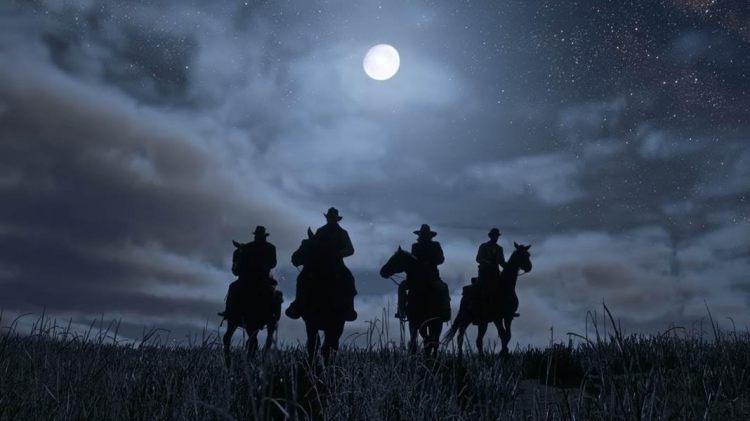Strauss Zelnick is very efficient with his answers. When I interviewed the CEO of Take-Two Interactive last week at the 2018 Electronic Entertainment Expo (E3), the big game industry trade show in Los Angeles last week, he gave some short answers. But when it came to topics that interested him, he gave engaging replies.
Zelnick says he’s not a creator of video games, and he doesn’t pretend to be. But he’s certainly one of the smartest people in the business. His New York publishing company has more than 4,200 people across 17 studios, including Rockstar Games, the maker of Grand Theft Auto V and the upcoming epic Western game Red Dead Redemption 2. And he proudly notes that his company generates more revenue than 14,000-person-strong French video game publisher Ubisoft.
While Rockstar wasn’t at the show, Red Dead Redemption 2 is looming over the fall season, and other publishers are giving it plenty of room, as they’re avoiding launching their own games near its October 26 launch date. In addition to Rockstar, Take-Two has its big 2K label (maker of NBA 2K games), mobile game publisher Social Point, and many other prominent game makers. Zelnick was very candid about why he thinks Take-Two’s strategy of focusing on quality is the strongest in the business.
Here’s an edited transcript of our interview.
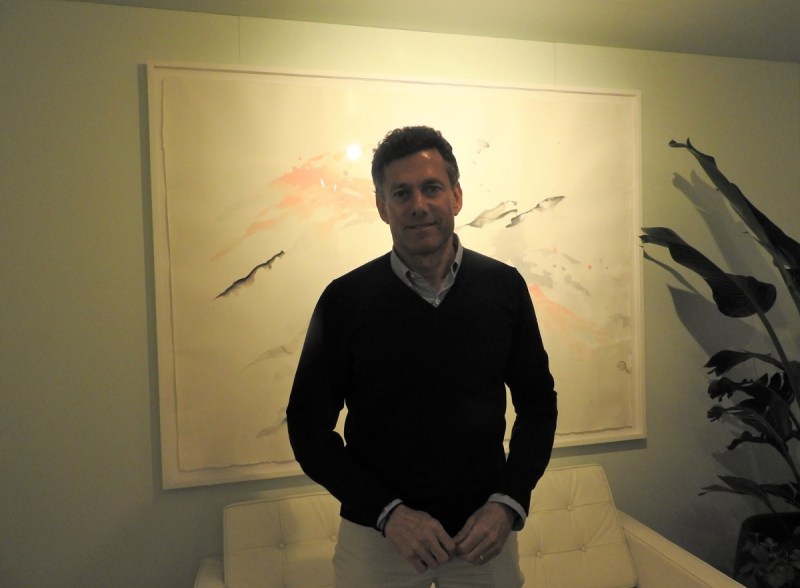
Above: Strauss Zelnick, CEO of Take-Two Interactive.
GamesBeat: How’s Red Dead Redemption 2 looking?
Strauss Zelnick: I feel good about it. The trailer views have been great. It’s looking good.
GamesBeat: I appreciate that kind of very well-done single-player experience still. Strong story, strong characters. I worry about what some people are saying about how single-player is dead.
Zelnick: I feel the same way. Historically, in entertainment, people take positions like that, but there are also people saying that it won’t work if it’s not a free-to-play battle royale. People really are saying that, and not even tongue-in-cheek. I don’t buy that. Single-player, in my opinion, is not dead, not even close. Companies that feel like they’ll just avoid the hard work of building a story and characters and go right to where the money is in multiplayer, I don’t think that’s going to work. I’d be surprised.
GamesBeat: With Call of Duty, I was always motivated by the campaign to go play six months of multiplayer.
Zelnick: I think that’s what happened with Grand Theft Auto Online. We certainly feel like there’s no evidence that people don’t want a single-player, because they’re still playing Grand Theft Auto V.

Above: The Vapid Hustler.
GamesBeat: Do you think some other motivation can eventually kick in? Your friends are all playing Grand Theft Auto Online, so you join in and that game keeps going forever?
Zelnick: For sure. It’s become a must-have title for a generation, if you’re a mature player. You get the machine and then how can you not have Grand Theft Auto? It’s become a social phenomenon.
GamesBeat: What do you think of the more real time nature of E3 itself? It seems like there’s a lot of announcements now, since the success of Fallout Shelter — you announce something at E3, and it’s up for download right now.
Zelnick: It’s still not really a consumer show. There are consumers here. I think the ability to deliver an experience quickly and seamlessly is probably a good thing for the business. I don’t know that it’s necessary for the show, but I do think people like instant gratification.
GamesBeat: Would you ever do something like a mobile game release at the show?
Zelnick: We wouldn’t be allergic to it. So far it hasn’t made sense. With mobile releases, you typically go to market in soft launch, and then you’re in market already. You don’t tend to have a big reveal and then you launch. I don’t know that it fits well with the show. We just wouldn’t do it. It’s not the way those games are marketed.
GamesBeat: Do you see Social Point taking advantage of your core IPs?
Zelnick: Possibly? It’s been our strategy so far — the biggest titles in mobile free-to-play are made for mobile free-to-play. I wouldn’t rule out the possibility that there are some IP where our labels say, “This could be a great mobile free-to-play title.” Right now we’re focused on new IP for that space, and that’s what Social Point is working on. But we’re open-minded. It’s going to be the intersection of what works for the labels and what works for Social Point. Everyone is focused on delivering a great consumer experience.
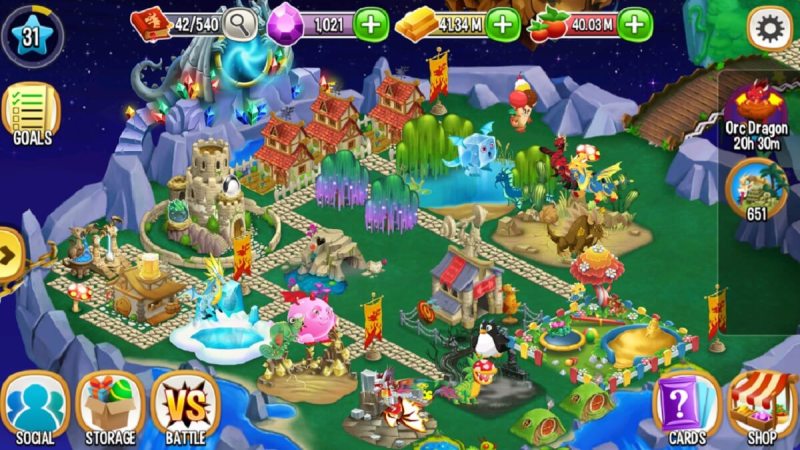
Above: Dragon City is one of Social Point’s big hits.
GamesBeat: When do you feel like you have to step in from your level, into what your studios are doing?
Zelnick: What makes you think I stepped out?
GamesBeat: Well, just the structure of Take-Two. You have a bunch of labels and a bunch of studios that generally seem autonomous. What things do you have to get involved in?
Zelnick: I’m really involved. I’m involved in pretty much all aspects of the company.
GamesBeat: I was thinking about the announcement of Hangar 13’s new office. Ubisoft seems to operate that way, where they don’t care about geography anymore. You don’t have a single studio in a single space making a game. Assassin’s Creed is made across seven studios or whatever it is every year.
Zelnick: I think you can achieve good creative results with a number of different structures. Hangar 13 is working on its own projects. It will have different locations if it feels like there’s talent in those locations that it feels would be able to work on those projects effectively. It tends to be our structure that our studios in particular locations work on particular projects. I don’t think it’s the only structure that can work in the business.
GamesBeat: When they come to you and say, “We’d like to open an office in Brighton,” how does that conversation unfold? Do you feel that your studios have to spread out like that if they want to get the talent they need?
Zelnick: It all depends. Those are two questions. I do, I think if you’re looking for the best talent in the business you do need a pretty dispersed array of studios, because I don’t think any one location has all that many incredibly talented people. I don’t micromanage the business, but it would be fair to say that opening a studio would be something that would rise to my level.

Above: Rockstar’s Grand Theft Auto V.
GamesBeat: As far as Rockstar and Red Dead are concerned, would they operate very differently than this example?
Zelnick: Not really, actually. Again, there’s a group of people in a location who are primarily focused on a title.
GamesBeat: If there’s a lot of moving parts in all those different locations, does that tend to concern you?
Zelnick: No. We have pretty good internal communications and systems. We’ve not found that having people in different locations is a problem.
GamesBeat: I talked to the CEO of Siemens not that long ago. He said he has 400 factories to keep track of, including a bunch in China that he can’t pull data out of.
Zelnick: He’s got a big issue. I don’t have that problem. We are a global business, but we’re not that big. We have 4,200 people. We have 17 studio locations. It’s not that far-flung. We’re still able to get our arms around it.
GamesBeat: I recall from Ubi that they have 14,000 people now.
Zelnick: They have 14,000 people, and their revenue is less than ours. We don’t understand it.
GamesBeat: Microsoft’s moves were interesting, acquiring more studios and delegating to Matt Booty to make things happen with that. I always thought it was odd that Sony had about two developers to every one at Microsoft, first-party. If you wonder why the console war went the way it did, I think a lot of the answer lies in that.
Zelnick: Possibly. It may lie in something else, though. I don’t know how you could be so confident that the answer is just that they had more headcount. It could be any number of other things too.
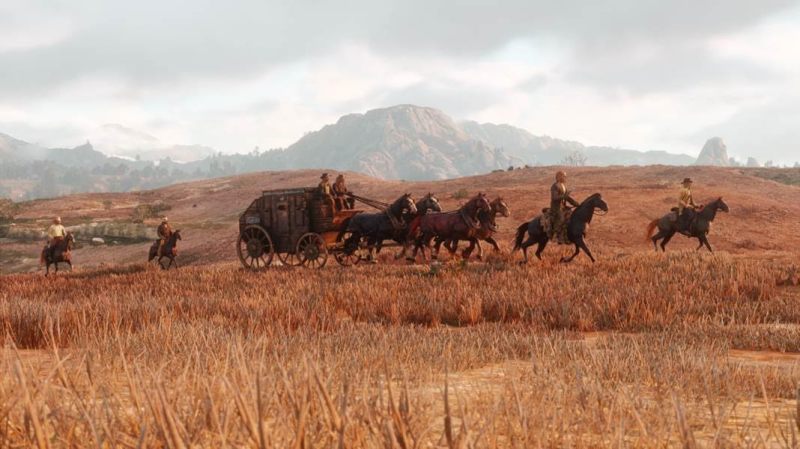
Above: Red Dead Redemption 2
GamesBeat: How do you set yourself up to make sure you have enough experimentation going on?
Zelnick: We say that our strategy is to be the most creative, the most innovative, and the most efficient. We really encourage our creative teams to follow what they’re passionate about. We give them a lot of resources to do that. We don’t tend to be focused on what used to work – “Let’s replicate what used to work.” We’re very focused on what’s on the cutting edge, what’s going to engage and entertain consumers in the future. We’re willing to take measured risk. When we get it wrong, we’re collaborative with the studios. We don’t point fingers.
That’s a recipe for encouraging people to do their best work. When we say we want to be innovative, we really mean it. But that means you have to accept certain things not going your way. Part of it is making sure the people who work at our company are people who like to innovate, who aren’t interested in doing something derivative, and who don’t want to accept anything less than the most extraordinary creative result. And then, give them the resources to do just that, and make sure your decision-making is in service of that.
You don’t say the words, “I want to be innovative…” and then say, “…but just deliver a sequel to this and I don’t care if it’s not that good, because I just want to get it in the box.” That’s why we don’t annualize titles. That’s why we sometimes have slippage. That’s why we’re so focused on making sure that every title is better than the last title. We don’t always succeed, but that’s the goal.
GamesBeat: When something like battle royale comes along, do you say, “I’m Strauss and you guys are doing the battle royale?”
Zelnick: What do you think the odds are, given what I just said?
GamesBeat: You say you’re very involved.
Zelnick: The fact that I’m very involved doesn’t mean I say stupid things. I’m involved by saying hopefully intelligent things that are going to advance our strategy. So no, I don’t do that. That wouldn’t be my entry even if I believed that. But with regard, for example, to virtual currency, I’ve had conversations where I said, “Wow, I think you ought to take a look at this and see if it makes sense.” Given that we have such a collaborative atmosphere, an atmosphere of mutual respect, if I say, “That looks pretty interesting, maybe you should take a look at it,” then people would take that seriously.
I don’t want a culture where I think I know more than the 4,199 other people who work here, and I’m sitting in my corner office and telling people what to do. I don’t believe in command and control. I don’t think that’s how you get the best out of a colleague or the best out of an organization. If I feel strongly about something – for example, compliance – we are a compliant company and I reserve the right to make that decision. I’m charged with making hard decisions. If I feel it’s an important decision I’ll make it and I’ll own it.
But I’m not a creator of video games. I don’t pretend to be. I work with the best and the brightest and try to find a way to attract them and retain them and encourage them and reward them so they’ll be a part of our system. Even in areas where I feel very, very competent—for example, I went to law school. I’m pretty competent there. But I wouldn’t tell Dan Emerson how to run his legal department. We would certainly collaborate and chat and make sure we saw things the same way. If we didn’t see things the same way, we’d make sure to talk it out until we arrived at an appropriate course of action.
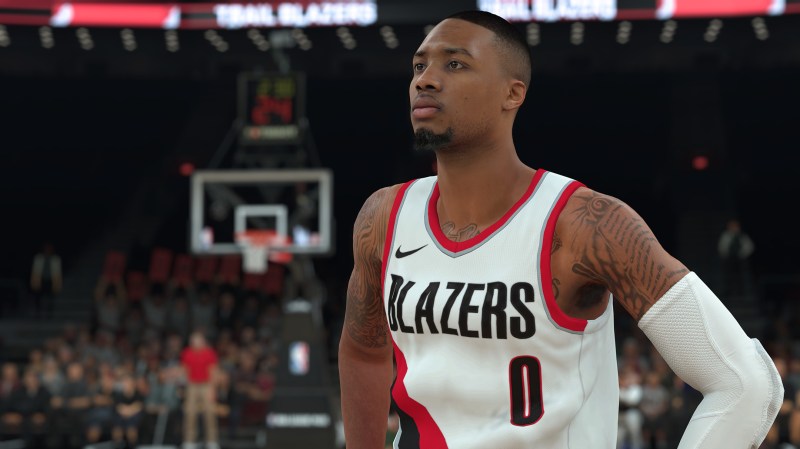
Above: The well-inked Damian Lillard in NBA2K.
GamesBeat: What would you have to say about the progress of making the industry more diverse?
Zelnick: Diversity is a very important value. We have a pretty diverse enterprise. I think we could do better.
GamesBeat: Do you initiate conversations on that front as well, then?
Zelnick: Yes.
GamesBeat: Something like the centralized technology that EA does with Frostbite, what do you think of that kind of strategy? Is that something you do?
Zelnick: We do not.
GamesBeat: Why do you think that’s the right call?
Zelnick: Take a look at our quality versus theirs. I don’t think it’s realistic to say to people, “We think you’re the best creators in the business. Come in and do your best work. Oh, and incidentally, you have to use this technology over here.” We do care what the technology is. We do care how much we spend on development. Rockstar has a proprietary engine. Within the 2K label there are proprietary engines. We also license external software.
We don’t think there’s much of a percentage in having a corporate engine. Midway had a vaunted corporate engine, corporate technology library. Midway filed for bankruptcy. There’s little evidence that having a corporate technology system is in service of the best entertainment properties. But reasonable people can disagree about that. It’s not our strategy.

Above: Lincoln Clay is the star of Mafia III.
GamesBeat: If Hangar 13 were to say, “Can you get us the Rockstar engine so we can use it,” what would you say to that?
Zelnick: We don’t intend to share technology across labels. We do share some. We do share best practices. But it would be—never mind Rockstar or Firaxis or any number of our other studios. Our studios are trying to create their own phenomenally competitive products. It seems unlikely that they would take another studio’s properties in any form and try to replicate them or jump off from them to a creative solution. It’s not what we’re trying to do. Everyone’s trying to create something new and innovative.
